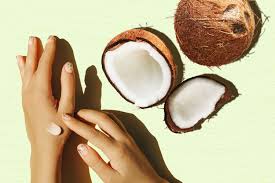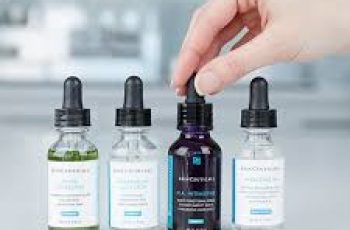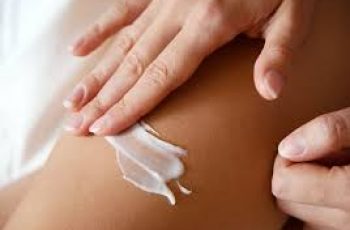
Coconut Oil in Skin Care
Coconut oil is one of the most popular ingredients in skin care because of its luxurious moisturizing feeling. Though most people are probably aware of this ingredient, not everybody knows how it works or what it’s made of.
Coconut oil contains primarily saturated fats and is used in many product types in skin care such as moisturizers, sunscreens, cleansers, and balms.
To find out if this ingredient is right for your skin type, take our quiz by clicking the button below!
What is coconut oil?
Coconut oil, (Cocos nucifera), is an extract of the coconut used in multiple forms across food and skin care industries.
Coconut oil can be used as either a refined or unrefined ingredient. Based on the processing of coconut oil and its resulting fatty acid concentrations and properties, coconut oil will have different functions in skin care. Many skin care products use coconut oils to treat conditions like eczema, rosacea, psoriasis, or sun damage.
What is unrefined coconut oil?
Unrefined coconut oil is an extract pressed from coconut meat, either alongside or separated from the coconut’s water. The process is called “wet pressing” with coconut water, and “dry pressing” without coconut water. (3)
After a little cleaning, no further processing is performed on unrefined coconut oil.
Unrefined coconut oil maintains the fragrance and flavor of coconuts, so is used in food products as well as skin care products.
What is refined coconut oil?
Refined coconut oil has been processed to change its saturated fatty acid concentration through pressure, chemical treatments, and application of heat.
Refinement of coconut oil results in a smoother, less solid product at room temperature product than unrefined coconut oil.
Refined coconut oil is more shelf stable than unrefined coconut oil, but contains fewer beneficial fatty acids.
Refined coconut oil is odorless and flavorless.
Benefits of unrefined coconut oil
Benefits of unrefined coconut oil in skin care
Unrefined coconut oil is made of different kinds of medium chain saturated fatty acids that hydrate and smooth the skin.
It also maintains a coconut fragrance and flavor.
It is safe to use on skin for adults and children as it is non-toxic, but it can cause clogged pores and acne.
Unrefined coconut oil features many potential skin benefits(4) :
antioxidant
anti-inflammatory
antibacterial
speeds wound healing
prevent stretch marks
Unrefined coconut oil is an occlusive ingredient; it is great at preventing trans-epidermal water loss (TEWL), loss of moisture from the skin due to evaporation.
The moisturizing and fatty acid properties of unrefined coconut oil have been shown to greatly assist in eczema treatments (5) and can help repair the skin barrier when combined with cholesterol and ceramides.
Unrefined coconut oil inhibits the growth of many skin bacteria. (9)
High concentrations of monolaurin (derived from lauric acid) assist in decreasing acne-causing bacteria and hydrating the skin barrier.
Unrefined coconut oil has even been shown to aid with healing on certain kinds of wounds on the skin of albino rats. (1)
Raw coconut even has a strong antioxidant capacity which may help slow skin aging. (21)
For those reasons, unrefined virgin coconut oil is considered a highly beneficial ingredient in skin care products unless you have acne or oily skin.
benefits of refined coconut oil
Benefits of refined coconut oil
Refined coconut oil is not comedogenic, as many of the pore-clogging fatty acids have been processed out.
Refined coconut oil products have a less greasy texture than unrefined coconut oils.
It is also odorless and flavorless.
Refined coconut oil has a much longer shelf life than unrefined coconut oil.
It is, however, less effective in hydrating skin and restoring lipids to the skin barrier than unrefined coconut oil is.
Take the Quiz
What kinds of fatty acids are in coconut oil?
The most significant fatty acid in coconut oils by concentration and uniqueness is lauric acid.
Lauric acid is easily absorbed by phospholipid bilayers and is easily processed by the liver. Out of all saturated fatty acids examined in one study, lauric acid demonstrated the smallest contribution to fat development in the body. (10) This means that using coconut oil poses no threat to your cholesterol or blood pressure levels.
The fatty acids found in coconut oils are helpful in hydrating the skin and fighting bacteria.
Lauric acid penetrates the skin through just the first few layers, while the rest of the coconut oil mostly hydrates the surface of the skin, preventing trans-epidermal water loss.
dangers of coconut oil
Dangers of coconut oil in skin care
The dangers of coconut oil are mainly allergies or improper use in your skin care regimen.
Besides being comedogenic, coconut oils are considered extremely safe, with an EWG rating score of “1,” the second best score after “verified.”
Coconut oils are free from many common causes of concern; they are sustainably sourced, useful in skin care, and have not been shown to have dangerous adverse effects.
Note that coconut oil might bleach your bedsheets.
Side effects of coconut oil in skin care
Overuse of occlusive ingredients like coconut oils can result in an excess of moisture on the face, which can lead to a change in microbiome on the skin.
The antimicrobial effects of coconut oil also affect the microbiome.
Use of unrefined coconut oil has a chance of clogging pores on acne prone skin.
Is coconut oil safe?
Is refined coconut oil safe for use in skin care?
Refined coconut oil is safe to use and common in skin care products.
Refined coconut oil doesn’t have many of the beneficial fatty acids unrefined coconut oil has that are needed to hydrate the skin, which means it needs to be combined with other moisturizing ingredients in many cases to be effective.
Is unrefined coconut oil safe in skin care products?
Unrefined coconut oil, also called virgin coconut oil, is safe in skin care products as long as you are neither allergic to coconut oil nor acne prone.
It is extremely common in skin care products.
Acne-prone skin may develop comedones from unrefined coconut oil.
Otherwise, it is a completely safe and even beneficial ingredient in skin care products.
Take the Quiz
Coconut oil and the microbiome
Does coconut oil affect the microbiome?
Yes, coconut oil has a big effect on the skin’s microbiome.
About 50% of the fatty acids in unrefined coconut oil are lauric acid.
Monolaurin is a monoglyceride derived from lauric acid that has well documented antimicrobial activity.
Monolaurin from coconut oil has been shown to kill Propionibacterium acnes, Staphylococcus aureus, Staphylococcus epidermidis, Pseudomonas aeruginosa, Escherichia coli, Proteus vulgaris, and Bacillus subtilis(19) and to decrease levels of Cutibacterium acnes. (20)
Coconut oil for specific conditions
Coconut oil is used in the treatments of many conditions because of its unique valuable fatty acid composition and occlusive nature.
It is used in skin care routines to treat a number of dry skin conditions as well as repairing sun damage and treating inflammation.
Does coconut oil treat acne or make it worse?
Unrefined coconut oil is comedogenic so it is not recommended for acne-prone skin
Refined coconut oil is non-comedogenic and safe for use in acne-prone skin types if used properly in your custom skin care regimen.
Refined coconut oil and coconut oil extracts without comedogenic fatty acids are good for acne if they contain monolaurin. (19)
Monolaurin decreases levels of acne-causing bacteria called Cutibacterium acnes.
The skin care brand VMV Hypoallergenics contains extracts of coconut oil that are not comedogenic and are safe to use in acne-prone skin.
(They have had supply issues during covid so some of their products are out of stock.)
Many of these products contain monolaurin.
These are our the best face creams with coconut oil but take the quiz and follow our suggestions to find the best products for your skin type.
Biopelle Tensage Gentle Gel Cleanser
$33.00
Out of Stock
Biopelle Tensage Intensive Serum 40, (10 ampoules)
$149.60
Add to Cart
Biopelle Tensage Intensive Serum 50 (10 ampoules)
$195.00
Out of Stock
Biopelle Tensage Radiance Eye Cream
$95.70
Add to Cart
DermAvance Arnika Forte Capsules
$40.00
Add to Cart
Bioderma Sensibio Foaming Gel Cleanser
$7.19
Add to Cart
Biopelle Brightening KNR Serum
$126.00
Add to Cart
Biopelle Retriderm Serum Plus 0.75% Retinol
$89.50
Add to Cart
Biopelle Tensage Advanced Cream Moisturizer
$89.66
Add to Cart
Biopelle Tensage Daily Serum SCA 15
$149.60
Add to Cart
Biopelle Tensage Gentle Gel Cleanser
$33.00
Out of Stock
Biopelle Tensage Intensive Serum 40, (10 ampoules)
$149.60
Add to Cart
Biopelle Tensage Intensive Serum 50 (10 ampoules)
$195.00
Out of Stock
Biopelle Tensage Radiance Eye Cream
$95.70
Add to Cart
DermAvance Arnika Forte Capsules
$40.00
Add to Cart
Bioderma Sensibio Foaming Gel Cleanser
$7.19
Add to Cart
Biopelle Brightening KNR Serum
$126.00
Add to Cart
Biopelle Retriderm Serum Plus 0.75% Retinol
$89.50
Add to Cart
Biopelle Tensage Advanced Cream Moisturizer
$89.66
Add to Cart
Biopelle Tensage Daily Serum SCA 15
$149.60
Add to Cart
Biopelle Tensage Gentle Gel Cleanser
$33.00
Out of Stock
Biopelle Tensage Intensive Serum 40, (10 ampoules)
$149.60
Add to Cart
Biopelle Tensage Intensive Serum 50 (10 ampoules)
$195.00
Out of Stock
Biopelle Tensage Radiance Eye Cream
$95.70
Add to Cart
DermAvance Arnika Forte Capsules
$40.00
Add to Cart
Bioderma Sensibio Foaming Gel Cleanser
$7.19
Add to Cart
Biopelle Brightening KNR Serum
$126.00
Add to Cart
Biopelle Retriderm Serum Plus 0.75% Retinol
$89.50
Add to Cart
Biopelle Tensage Advanced Cream Moisturizer
$89.66
Add to Cart
Biopelle Tensage Daily Serum SCA 15
$149.60
Add to Cart
Coconut oil for eczema
Moisturizers containing occlusive ingredients like coconut oils are used commonly in skin care to hold moisture or soothing ingredients against the skin.
Unrefined coconut oil might be good for use in eczema depending on your skin type. It contains high concentrations of fatty acids like lauric acid that have been proven to treat eczema. (3)
Refined coconut oil has far fewer fatty acids and is less hydrating and reparative to the skin barrier. This kind of coconut oil is not recommended for eczema treatments.
Some of the best other oils for treating eczema have high concentrations of anti-inflammatory fatty acids like linoleic acid. Some oils with high concentrations of linoleic fatty acids are:
Argan oil
Evening primrose oil
Sunflower oil
Coconut oil for psoriasis
There are many effective treatments for psoriasis that contain coconut oils or similar saturated fats for their hydrating, protective properties.
Layering your coconut oil products in particular ways with other products can help you control the absorption rate of ingredients into your skin.
coconut oil for hair care
Coconut oil for hair care
Coconut oil is a good ingredient in hair care because it contains fatty acids that bind with and hydrate hair.
It has very high concentrations of lauric acid, which is very useful in hair care products for taming dry or frizzy hair. (2).
One study shows that between coconut, mineral, and sunflower oils, coconut made the largest impact in reparative hair care.
Coconut oil was able to bind the proteins in hair strands more effectively than the other oils, making an appreciable positive impact in the hair health of subjects.
Which kinds of skin care products use coconut oil?
Coconut oil can be used in any product that needs a thick occlusive, a smooth emollient, or a safe natural oil based ingredient.
Sunscreens often contain coconut oils to keep skin hydrated, but coconut oil alone does not provide sufficient SPF to prevent UV damage, and should be combined with sunscreen ingredients.
Moisturizers often use coconut oils for their combined antibacterial, hydrating, and occlusive properties.
Cleansers with coconut oil use it to hold exfoliating or otherwise cleansing ingredients against the skin and to eliminate surface bacteria. These leave a fatty acid residue on the skin after rinsing.
Serums with coconut oil could be used for antiaging in combination with retinoids because they also have antioxidant properties good for anti-aging regimens.
Antiaging creams such as retinoids may contain coconut oil.
Skin lightening creams may contain coconut extracts but these are not the best types of products to use to lighten skin because they are high in saturated fatty acids.
Best coconut oil products
The best coconut oil product for you depends on your Baumann Skin Type and personal skin conditions.
Here are some of our favorite products with coconut oils, look for your octagon to see which products are right for you!


